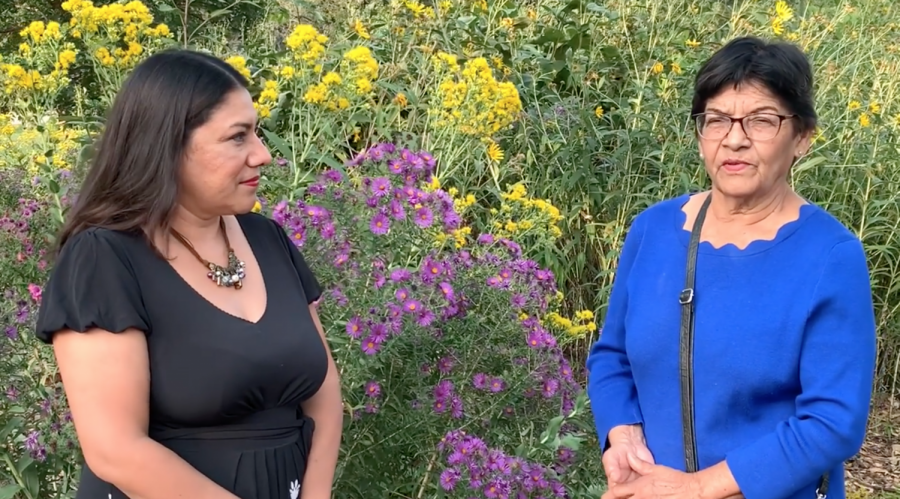Latinos en Evanston North Shore debuts “Los Años Dorados,” a program for elderly community members
Photo courtesy of Latinos en Evanston North Shore
Fabiola Alfonso (left) is speaking with her mother Celia (right). The latter is the first member of Los Años Dorados, a group organized by Latinos en Evanston North Shore meant to facilitate community between Spanish-speaking elders.
September 30, 2021
When she came to the United States, Fabiola Alfonso’s mother, Celia, brought with her something Alfonso said is often taken for granted: her wisdom.
Members of the elderly community have a collective wisdom informed by years of experience, Alfonso said. Instead of letting it go to waste, she said their voices should be heard.
So, when Mercedes Fernández, president of Latinos en Evanston North Shore, brought up the idea of creating a program for elderly community members to connect with other Spanish-speakers, Alfonso was thrilled.
“They are giving, giving, giving,” said Alfonso, the organization’s vice president. “We haven’t been able to give back… this club is gonna give back a little bit of what they have given us.”
The organization decided to name the new program “Los Años Dorados,” or “The Golden Years.” The group provides social programming as well as language access for resources like legal services, financial planning and COVID-19 information. It debuted on Sept. 12 — Grandparents Day.
Celia, who is from Mexico, was the program’s first member. She said through an interpreter that adjusting to life in another country was difficult, especially because life is organized and structured differently in the U.S.
Outside of her church, Celia said she hasn’t been able to find much community in Evanston. She’s excited to connect with others through Los Años Dorados.
“I’m really excited because I’m going to meet people from my own age,” she said. “To share experiences that we have learned from our family, from our culture.”
Although the program hasn’t hosted any events yet, Fernández said it plans to create spaces where members can dance, watch Spanish movies and engage with one another and their culture.
Celia loves to dance, and is excited to do so again in Los Años Dorados.
“I love music from the ’60s, ’70s and tango,” Celia said. “I missed it a lot.”
For elderly community members like Celia, Alfonso said the last year has been particularly isolating, since they haven’t easily been able to leave the house and connect with others. This feeling is amplified in suburbs where there isn’t a large Spanish-speaking community, Fernández said.
The elderly community carries extensive culture, traditions, values and principles from lived experience, Fernández said. Instead of letting community members pass unnoticed, she said residents should listen.
“In Evanston … Latinos are still invisible. Our accomplishments, our problems, our needs are not counted,” Fernández said. “The only way to make our voices heard is to organize … and cover the needs that are not covered by the government or the schools.”
Alfonso said her organization also informs participants about resources like legal services and financial planning that language barriers can otherwise make inaccessible.
These barriers prevented some non-English speaking community members from learning vital information about COVID-19, Alfonso said. Unable to access essential information about potential precautions and how the virus spreads, she said some elderly community members lost their lives.
“There was a lot of misinformation about COVID in health services, and some of our leaders passed away without even saying goodbye,” Alfonso said. “(This program) honors the ones that are already gone.”
Email: [email protected]
Twitter: @KatrinaPham_
Related Stories:












